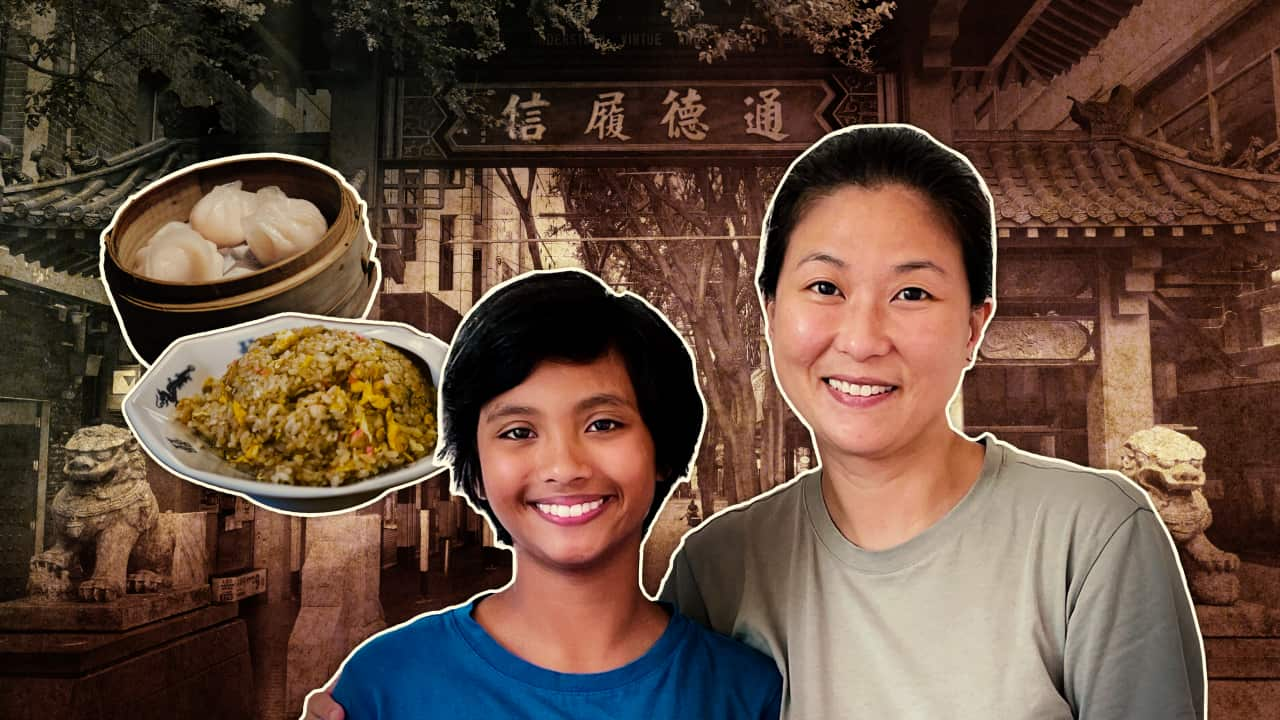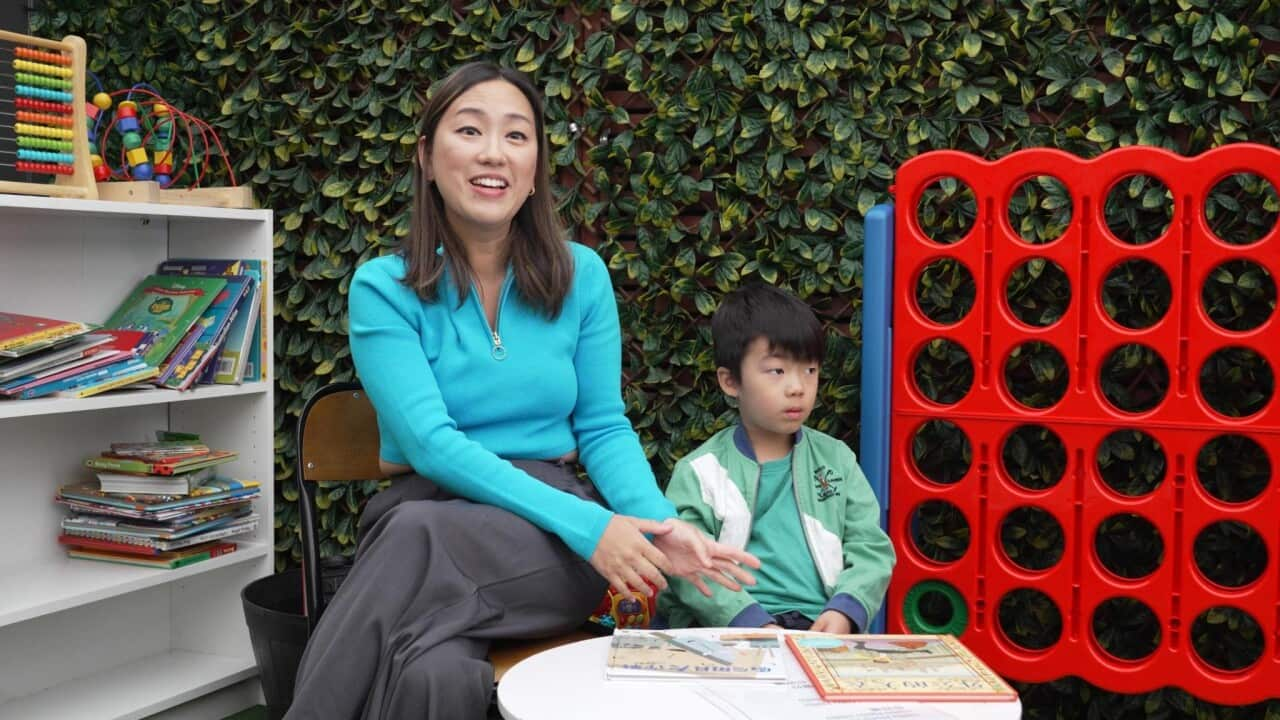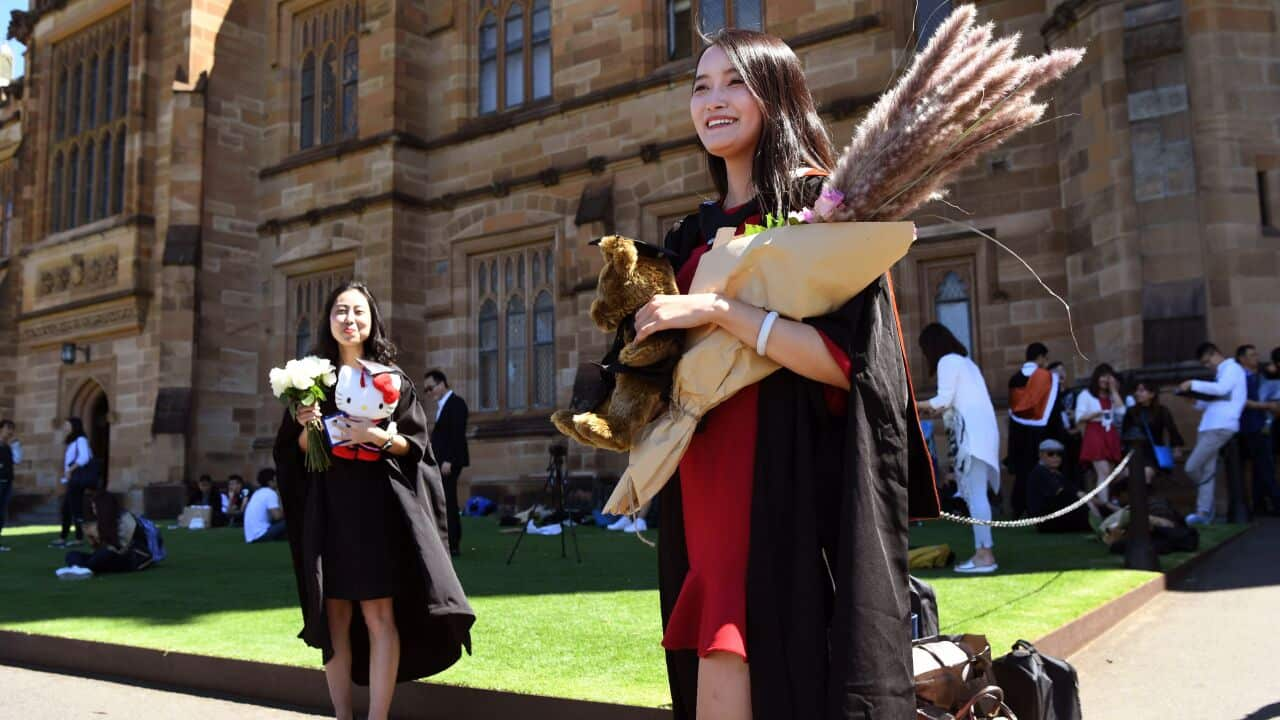Josephine Chau remembers her weekly Cantonese classes, spent painstakingly copying pages of Chinese characters, as being "soul-destroying".
But after moving to Australia from Hong Kong when she was five, she had little choice but to suffer through them: Her mother even pretended she couldn't speak English to force Chau to use her native tongue.
Despite this gruelling introduction to learning languages, Chau — now in her 40s —has decided to enrol her children in Cantonese classes — even though she's aware the 2,000-year-old language is gradually waning in popularity.
While once the most common Chinese language in China, Cantonese has been overtaken by a standard version of Mandarin used as the country's official language since the 1950s.
Today, it’s spoken mostly in Hong Kong, Macau and parts of south-eastern China. It's also widely used by the Chinese diaspora around the world, particularly in Vietnam and Malaysia.
Chau says that over the years she has come to understand how important the language is for connection to culture.
Australia is multicultural and if we don't remember some of where our ancestors come from, it's very easy to forget that we were all new to this country at some point, and to just appreciate the differences that we have, and also the similarities.Josephine Chau
But Chau's attitude to language learning is at odds with dominant attitudes in Australia, where speaking English is considered sufficient and multilingualism — the ability to speak more than one language — is often framed as an asset for improving job prospects, something that experts are now questioning.
Cantonese is an endangered language
Many Australians would recognise Cantonese as the language often spoken by owners of , which popularised dishes such as sweet and sour pork and fried rice.
It's spoken at home by 1.2 per cent of the Australian population (295,281 people) and is the fourth most common non-English language in Australia after Mandarin, Arabic and Vietnamese, according to the 2021 Census.
Adjunct research fellow at the University of South Australia, Andrew Scrimgeour, who is an expert in language teaching, says the dominance of Mandarin partly stems from Australia’s political relationship with China and the importance placed on the language during the period Mandarin-speaking Kevin Rudd was prime minister.
With the focus on Year 12 ... on careers and academic pathways, the languages that have been prioritised are those languages of economic importance and not languages of social importance.Andrew Scrimgeour, University of South Australia
In Greater Sydney, Cantonese is the third most common non-English language spoken at home, with 144,538 people speaking it, according to 2021 Census figures.
But it's not offered as a Higher School Certificate subject in NSW, which only includes Mandarin as part of its "Chinese" curriculum, an education department spokesperson has confirmed.
Vietnamese and Hindi — the next two most popular languages spoken at home in Greater Sydney — can be studied as part of the HSC.
A NSW Education Standards Authority spokesperson told SBS News the education department offers one of the most comprehensive school language curriculums in the world, with around 60 courses available.
"Our language offering continues to expand and evolve over time in response to feedback from the community," they said in a statement.

Former Australian prime minister Kevin Rudd is known for his Mandarin language skills. Source: AAP / Joel Carrett
While "Chinese" is often used as an umbrella term to describe Mandarin, there are several native dialects spoken by Chinese people, which are distinct languages.
Scrimgeour points out that Cantonese and Mandarin are more different than Spanish and Italian.
However, there is no separate official world language code to describe Cantonese, and it's grouped together with Mandarin as "Chinese".
This is partly why Cantonese was excluded from a world-first study led by the Australian National University and published in the Nature Ecology & Evolution scientific journal in 2021, which found almost half the world's languages — around 7,000 have been documented — are considered endangered.
University of Queensland professor of linguistics Felicity Meakins, who contributed to the study, says Cantonese is also considered at risk, even though millions of people speak the language, because of the low number of children learning it. This reduces the likelihood of it being spoken in the future.
Fewer Australians learning languages
The absence of Cantonese in school curriculums means students have to instead rely on language schools but these institutions are also experiencing a decline in interest.
When the Sydney Chinese School first opened 50 years ago, principal Meggy Sin says it taught Cantonese only, but now 60 per cent of its students are learning Mandarin. Even Cantonese students now learn some Mandarin in later years.
The increasing rarity of Cantonese is one of the reasons Chau chose to enrol her daughter in Cantonese classes first, rather than Mandarin.
"If she wanted to learn Mandarin in more depth later in life, that will be very easy for her to find," Chau says.
"But if she wanted to connect with the Cantonese side of her culture, that'll be a lot harder."

Josephine Chau with her daughter Remy. Source: Supplied
"I think prior to going there, she didn't really meet a lot of kids like herself," says Chau, adding that there isn’t a big Chinese community where they live.
The decline in language learning is not isolated to Cantonese.
Across Australia, there has been a dramatic drop in language learning since the 1960s when.
By 2022, the proportion of Year 12 students studying any language had dropped to 8 per cent, down from 11 per cent in 2010, according to the Australian Curriculum Assessment and Reporting Authority.
This decline has happened despite Australia being a multicultural country in which almost a third of the population was born overseas, and 23 per cent use a language other than English at home. Around 300 languages are spoken.
What are we at risk of losing?
The declining interest in learning languages in Australia has wide-ranging implications.
Meakins, who has helped to document Indigenous languages over two decades, says health and wellbeing indicators improved in communities where people were either maintaining their traditional language or renewing it.
Connecting with language and other parts of your culture really does strengthen a person's identity.Professor Felicity Meakins, University of Queensland
Relatedly, research conducted in Japan and published in the journal Multilingua in 2019 found children who did not get the chance to learn the language spoken by their parents often later regretted this.
This has potential ramifications at a time when 90 per cent of the world's languages could be lost within a century if the most pessimistic predictions are realised.
Sarah Richardson, executive director of the Asia Education Foundation at the University of Melbourne, says language learning is both an intellectual pursuit that is beneficial for brain development and also a window into another culture.
"Languages are repositories of cultural traditions and ways of seeing the world," she says.
"Learning another language enables a better understanding of alternative perspectives which is enormously beneficial when we engage globally."
In a society where mixed race couples are becoming more common, it can also foster understanding at a household level.
Melbourne resident Belle Kwan, who was born in Hong Kong, says learning Mandarin gave her fiance Russell Brenner a deeper understanding of Chinese culture. For example asking someone in Mandarin whether they have eaten basically means asking if they have eaten rice. The word for meal — 饭 (fan) — is essentially synonymous with rice.
Brenner started learning Mandarin last year and says it's helped him to better understand Kwan’s family.

Belle Kwan says her fiance Russell Brenner's decision to learn Mandarin brought them closer together. Source: Supplied
"Interactions [from] the past now make perfect sense — they weren't being impolite, they were literally translating what they knew."
Being able to speak in Mandarin has brought the couple closer, and also given them a common interest.
"[Russell will] randomly say something in Mandarin in our everyday conversation. It'll make me stop and it'll make me laugh," Kwan says.
It feels like home when you speak your home language — there's something quite intimate about it.Belle Kwan
Is learning a language still necessary?
Programs such as Google Translate and other artificial intelligence (AI) programs have made direct translations more accessible, but Meakins says they do not provide context about the nuances, etiquettes and other subtle cultural practices that can be crucial to communicating effectively, and that can make and break business deals.
For example, a simple word-for-word translation of the English phrase "raining cats and dogs" would not be sufficient to describe its meaning, which refers to heavy rain.
"The importance of human beings continuing to learn languages and being multilingual to connect the world community is still absolutely important," Meakins says.
Speaking multiple languages improves employability, fosters respect for people from other cultures and gives young people direct access to content that would otherwise be inaccessible, including literature, music, theatre and cinema, according to a 2020 OECD Programme for International Student Assessment (PISA) report.
But it found students aged 15 years old in Australia and New Zealand spent the least amount of time in foreign-language classes compared with other OECD countries. They studied for just 1.2 hours a week compared to the OECD average of 3.6 hours in 2018.
Why we should reconsider language study
Languages are compulsory for most Australian students in primary school and the early years of high school, but Scrimgeour says the experience often doesn't inspire them to continue.
At the moment ... [students] sort of half-learn somebody else's language that they don't intend to use, and they learn nothing about the half a dozen languages that are probably present in their classroom.Andrew Scrimgeour, University of South Australia
Scrimgeour says it may be time to let go of the idea that participating in a one-hour lesson once a week is enough to enable students to read a book in a different language.
Realistically, most students don't continue language studies in high school and even those who do face a high workload to keep up with other students who are often native-language speakers, which discourages non-native speakers from continuing, he says.
Instead, Scrimgeour says language lessons should aim to inspire interest in languages, especially in the younger years, and shift the focus to a more social, interpersonal motivation for learning.
It's been noted for example that students in many parts of Australia could potentially converse with foreign language speakers on almost any street. The problem is they don't have to because everyone communicates in English.

The diversity of Australia's population means it would be possible to practice many different languages. Source: AAP / Dan Himbrechts
A multicultural country like Australia should be doing more to both acknowledge, recognise and understand the languages that other people speak.Andrew Scrimgeour, University of South Australia
"There's not necessarily any vocational or career orientation to it — it's 'who are my neighbours?'"
Mira Pernice lived in China for six years as a child and decided to rekindle her Mandarin studies in Australia two years ago, partly because it benefited her socially.
"There are a lot of Chinese people at my school and living near my area and sometimes they have difficulty communicating in English," says the 15-year-old, who is of South Korean and Italian descent.
"I feel [knowing Mandarin] enhances my social skills because we can communicate in Chinese."

Mira Pernice says learning Mandarin has benefited her socially. Source: Supplied
How to keep languages alive
Meakin says preserving languages can be done if there's energy, interest and desire within a community. This often comes down to nation-states supporting things like bilingual education.
She says speaking to children in a native language at home is generally not good enough to improve their skills, as they spend most of their day at school in an English-only environment.
Countries such as New Zealand have managed to strengthen languages such as Māori in recent years, through targeted programs.
"Now more of the younger generation [speak] the language even than the older generations," Meakin says.
For parents who want their children to learn a language but are not native speakers at home, Meakin says it helps to pick a language that's relevant to them, or that will be easy to continue learning at school.

Parents who want their children to be fluent in their native language may need to do more than speak to them in the language at home. Source: AAP / Lukas Coch
When asked about declining enrolments, a NSW Department of Education spokesperson says the department recognises the significant role languages play in fostering intercultural understanding and empathy, adding that these skills are essential for the next generation of leaders.
"We encourage students to choose HSC subjects that align with their passions, interests, abilities and post-school goals. This includes supporting all students to have access to a language syllabus," she says.
A spokesperson for the federal Department of Education says the government is committed to supporting the teaching and uptake of languages in schools, although noted the responsibility of state and territory authorities.
"Education authorities, school leaders, teachers and communities determine which of the 14 languages are taught within their schools dependent on their local needs and contexts," the spokesperson said.
The spokesman also noted federal funding for the Early Learning Languages Australia (ELLA) program which introduces young children to 13 languages other than English using interactive play-based digital applications (apps) including Mandarin, Indonesian, Japanese and Korean.
Scrimgeour says while there is support for community languages, he hasn’t seen much discussion of developing bilingualism in monolingual students.
He believes the key to language learning may rest on helping kids notice the languages spoken in the world around them.
"If we [can't] open up kids to look around their world and see languages and think about languages — even if they can't speak those languages — then I think we're not achieving the best that we can.
"We're just going to be embedded in this warm and fuzzy view that it's all about learning to speak — when actually it's more about learning to understand others."















